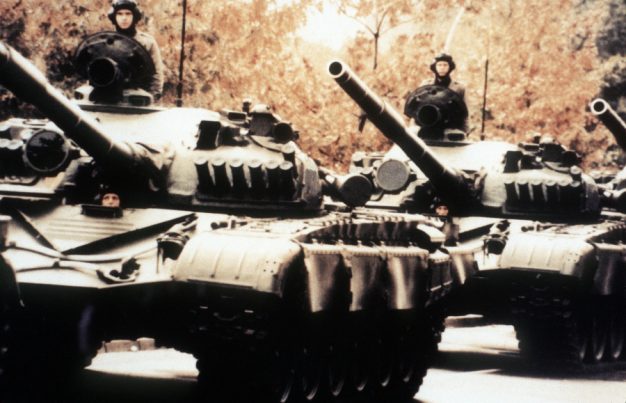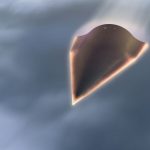
Newly declassified documents reveal U.S., Russia close to nuclear war in early 1980s
Monday, October 26, 2015 by usafeaturesmedia
http://www.nationalsecurity.news/2015-10-26-newly-declassified-documents-reveal-u-s-russia-close-to-nuclear-war-in-early-1980s

(NationalSecurity.news) Intelligence documents recently declassified by the Obama Administration reveal that the Soviet Union believed that the United States was preparing for a preemptive nuclear strike in the early 1980s, and was itself dangerously close to launching first, The Washington Post reported.
According to the 109-page document, “The Soviet ‘War Scare,’” dated February 1990 and prepared by the President’s Foreign Intelligence Advisory Board during the George H. W. Bush Administration, the Soviets believed that a nuclear readiness exercise code-named “Able Archer 83” was in actuality NATO preparing a preemptive nuclear strike against the Moscow-led Warsaw Pact.
“The Soviets had concern that the West might decide to attack the USSR without warning during a time of vulnerability… thus compelling the Soviets to consider a preemptive strike at the first sign of US preparations for a nuclear strike,” the document states.
To counter this strike – one which the West never intended to launch – then-Soviet leader Yuri Andropov initiated Operation RYaN, the Soviet human intelligence effort to detect and preempt a Western “surprise nuclear missile attack.”
“In 1983, we may have inadvertently placed our relations with the Soviet Union on a hair trigger,” the review concluded.
The Cold War-era drill – indeed, the entire period – has long been debated and, often, the implications of how close the world came to nuclear catastrophe grossly underestimated, until now.
The exercise came on the heels of the Soviet downing of a South Korean commercial airliner and as the West was preparing to deploy U.S.-made Pershing II intermediate-range and ground-launched nuclear cruise missiles in Europe in November. Still, there was “a long-running debate about whether the period known as the ‘war scare’ was a moment of genuine danger or a period of bluster for propaganda purposes,” the Post reported.
However, the just-released review makes it clear that the Soviets took the “scare” as real, and that U.S. post-assessments did not take it seriously enough.
- Have you ‘liked’ NationalSecurity.news on Facebook? Click here!
The exercise was a two-part scenario: “Autumn Forge 83” simulated a conventional war with the Warsaw Pact, while “Able Archer 83” simulated the same conflict gone nuclear. As the exercises progressed, U.S. and Western intelligence detected an unusual level of preparedness on the part of the Soviets.
According to the report, that included “improvements of Warsaw Pact combat readiness (by recalling reservists, lengthening service times, increasing draft ages, and abolishing many draft deferments),” as well as “an unprecedented emphasis on civil defense exercises, an end of military support for gathering the harvest (last seen prior to the 1968 Czech invasion),” and other preparations including raising the readiness of nuclear forces.
“Never, perhaps, in the postwar decades has the situation in the world been as explosive and, hence, more difficult and unfavorable as in the first half of the 1980’s,” said Soviet leader Mikhail Gorbechev in 1986, according to the review.
Fortunately “the military officers in charge of the Able Archer exercise minimized this risk by doing nothing in the face of evidence that parts of the Soviet armed forces were moving to an unusual level of alert,” it said.
The review notes also that, a few weeks after the end of the exercise, President Ronald Reagan had expressed concern about Soviet war fears.
According to an assessment of the review posted online at the George Washington University’s National Security Archives: “A week after Able Archer 83’s end, on November 18, 1983, the President wrote in his journal, ‘George Shultz & I had a talk mainly about setting up a little in house group of experts on the Soviet U. to help us in setting up some channels. I feel the Soviets are so defense minded, so paranoid about being attacked that without being in any way soft on them we ought to tell them that no one here has any intention of doing anything like that.’”
Later, Reagan asked his ambassador to the Soviet Union, Arthur Hartman, if the Kremlin really did fear a preemptive strike by the U.S. – a question the 1990 review answered.
“There is little doubt in our minds that the Soviets were genuinely worried by Able Archer… it appears that at least some Soviet forces were preparing to preempt or counterattack a NATO strike launched under cover of Abler Archer” and that “the President was given assessments of Soviet attitudes and actions that understated the risks to the United States.”
The review states that U.S. intelligence made a grave error in assuming that, “since we know the US is not going to start World War III, the next leaders of the Kremlin will also believe that.”
- Have you visited our online store? Click here for the NationalSecurity.news Commissary online!
See also:
Tagged Under: Tags: Cold War, High Priority, Mutual Assured Destruction, nuclear war, Russia, Soviet Union, Soviet War Scare, United States, World War 3






